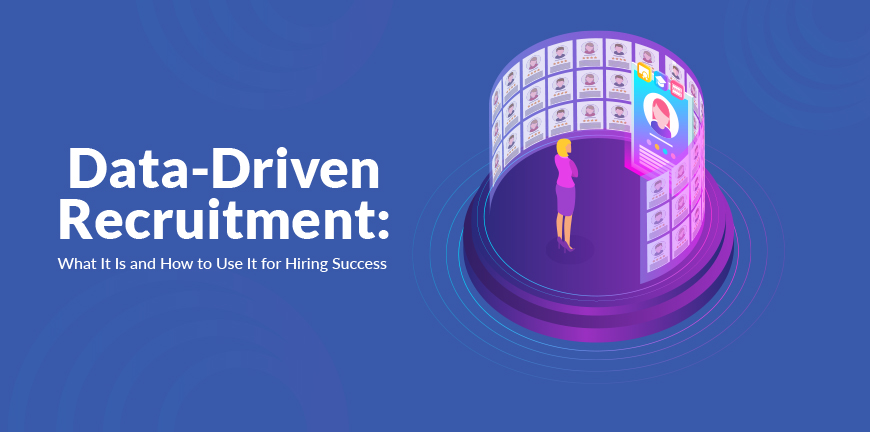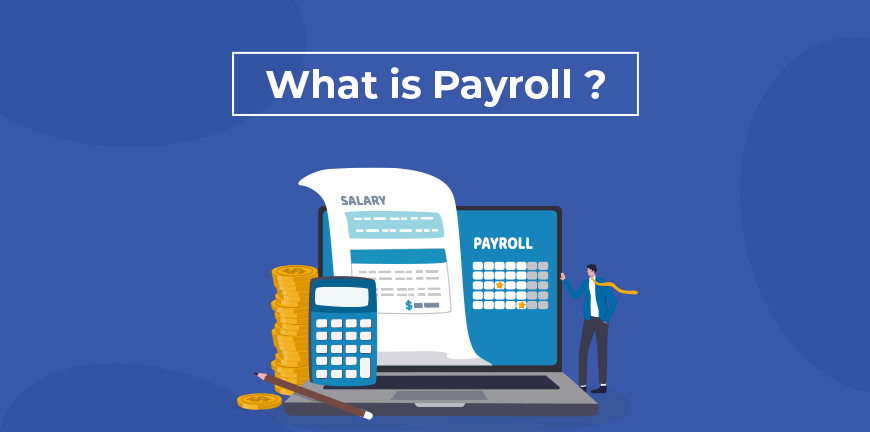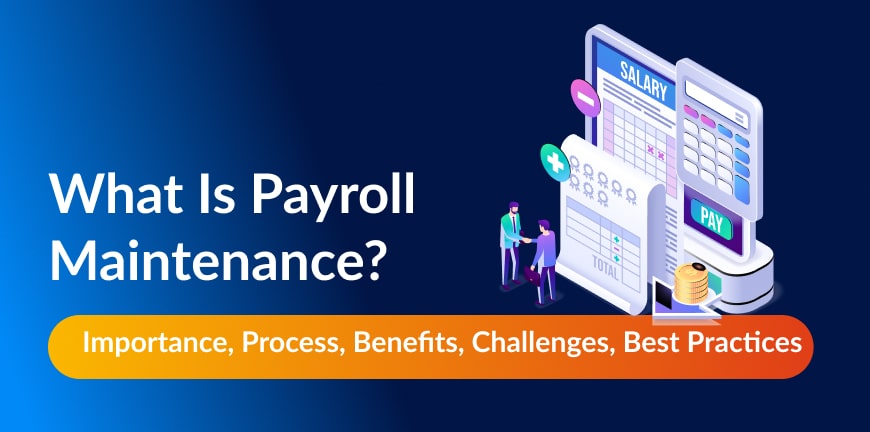
Data-Driven Recruitment: What It Is and How to Use It for Hiring Success
11/04/2023
How to Attract Talent with the Right Employee Value Proposition (EVP)?
04/05/2023Businesses across the globe have become hugely employee-centric. But, unlike before, nowadays, employers are more sensitive towards the needs of their employees, as they believe employee satisfaction is the most significant asset to ensuring the growth of their organization. What’s one of the fundamental aspects of ensuring employee satisfaction? Payroll! An error-free, seamless payroll process not only helps achieve employee satisfaction but also helps an organization maintain compliance and boost productivity.
What is Payroll in HR?
Payroll meaning in HR – Payroll in HR involves salary payments, tracking work hours, computing pay, and distributing payments via direct deposit or checks to employee bank accounts. Companies must also perform payroll accounting, a system to track business expenses related to payroll, which includes employee compensation, payroll taxes, and other employee benefits payments and deductions.
Streamlining the employee payroll process is a significant function that cannot be ignored by an organization, regardless of its strength. But undertaking HR payroll management activity in-house consumes a significant amount of your critical time while taking away focus from “need of the hour” activities, which is why most businesses choose to outsource their payroll management to specialized firms equipped with payroll specialists who use advanced technology to ensure flawless payroll processing for your company.
What is the Payroll Process?
Payroll has a lot of changing parts. Before breaking the payroll into its parts, some other decisions/responsibilities need to be taken.
Here are some of the pre-payroll processing steps you need to complete before starting the payroll process:
- Deciding on your pay frequency
- Mode of pay for employees: choose between paper checks and direct deposit.
- Establish state or local tax IDs’
- Register for an Employer Identification Number (EIN) and state accounts- If you do not have an EIN, visit the IRS website to set one up
- Have an Electronic Federal Tax Payment System (EFTPS) account
What are the Stages of Payroll Processing?
A business owner understands the complexities involved in payroll, as they make up the highest expenses of a company every month, and to add to that, it is a time-consuming task.
Some of the steps to follow to successfully execute the payroll process from ground zero are:
1. Create an employee list
The first step is simple. The employer needs to make a list of the existing employees as well as the newly onboarded ones.
2. Define your payroll system and policy
To ensure a standard, seamless payroll execution, companies need to clearly define policies and have those pre-approved by management. These policies include a leave and attendance policy, a pay policy, a benefits and compensation policy, etc.
3. Collect employee data
Make sure to have gathered the necessary data from each employee, like their PAN, address, bank account details, etc., to start payroll processing. It is advised to collect all the required employee input at the time of joining by the teams concerned.
4. Verify employee data
After receiving data from employees, verify the details concerning company policy, approval model, etc. Ensure that active employees are taken into consideration and former employees are excluded from salary and compliance payments
5. Calculate payroll
Calculating the employee payroll is the most crucial step of the payroll process. Payroll calculations are usually carried out using payroll software. The four important elements in payroll calculation are:
- Calculation of gross pay, considering the number of hours worked, PTO, if worked overtime, and other additional pay elements
- Calculating payroll taxes and other deductions like additional insurance etc.
- Determine the net pay by subtracting the employee’s deductions from the gross pay. The leftover amount is the net pay or what you call the “take-home pay” of an employee.
- Check the payroll results for accuracy
6. Pay employees’ salaries
After deductions from the gross pay, they are calculated as the net pay or take-home pay, which is what you will be paying your employees. Depending on the schedule you have established for payment of salaries, whether each month or quarterly, you have to disburse it into your employees’ accounts accordingly. The mode of payment could be by paper checks, direct bank deposits, or even cash, depending on your preferred method.
7. Filing and Payment of taxes with adherence to statutory laws
As per government rules and regulations, you need to file and deposit taxes by adhering to the defined labor laws. Some of the common statutory requirements that businesses must follow include the provision for minimum wages, paying overtime wages to workers, deduction of TDS, contribution to schemes such as PF, ESI, etc., generation and distribution of pay slips, and tax computation sheets.
Distribute pay slips along with the tax computation sheets to the employees. An automated payroll system does this job for you. Employees can log in to their accounts and access their pay slips at any time.
What are the Challenges in Handling the Payroll Process?
-
Keeping yourself updated about the statutory compliance laws
To run a successful business, you need to follow a legal framework that is composed of 4 important components- TDS, PF, ESI, and PT.
The compliance process is often complicated and can turn out to be expensive if not done the right way, which is why most businesses choose to outsource their payroll to a third-party service provider. Non-adherence to the statutory law can lead to hefty fines and penalties, which is why you need to be up to date on all tax and payroll statutory changes.
Why is it complicated? Firstly, because the laws change frequently and often, businesses do not update themselves about these changes, which ends up costing them. Secondly, most businesses still tend to use spreadsheets and manual methods to work on being compliance-free, which is inefficient as they are time-consuming and inaccurate.
-
Spreadsheet complications
As mentioned above, using spreadsheets creates complications as it is a lengthy and time-consuming process. While they work for some businesses just fine, with an increasing employee count, it tends to get difficult and gruesome. Also, this requires the work of multiple teams, giving way to mishandling or mismanagement of information.
Spreadsheets cannot be employed to be 100% compliant with tax laws month-on-month.
-
Data security
For payroll accounting or processing payroll, employees provide you with certain sensitive data and official documents like their bank account details, PAN, Aadhaar, etc. Mismanagement or compromising these confidential details can hugely damage the reputation of the company. Paper-based documents can be misplaced or misused easily.
-
Lacks flexibility
In the HR payroll system, employees often approach the payroll team to have their particulars updated, as the team needs to keep all the documents up-to-date to ensure smooth payroll accounting. These multiple-request demands are extremely time-consuming and turn out to be inefficient upon failure to update these records, resulting in the wrong crediting of salaries.
If employees fail to submit the records on time, the entire system can come to a halt.
What are the Benefits of Outsourcing Payroll Services?
Employers who lack the administrative resources or expertise to run payroll outsource it to third-party payroll service providers. There are various advantages to outsourcing payroll-
- Time-saving- Payroll processing is time-consuming. When outsourced to a third-party provider, businesses can focus on other core business functions that can grow their organization.
- Reduced errors- Payroll providers automate the labor-intensive aspects of payroll, which results in accurate and error-free results.
- Improved security- A payroll service provider invests in technology that can help prevent any security breaches, safeguarding the employees’ confidential data.
- Compliance maintenance- Payroll service providers stay on top of the changing government regulations thereby preventing any incompliance.
- Integrated data- Improved data accuracy as payroll is integrated with time and attendance, benefits, and other HR applications.
- Reduced costs- The error-free payroll process and adherence to compliance laws help businesses save money by preventing them from paying unnecessary fines or penalties that can occur due to incompliance.
How to Pick the Best Payroll Software for Your Business?
Choosing the right payroll software is a key financial and operational investment for your organization.
Before you make your choice, there are a few parameters you need to consider, like:
- Size of your company
- pay structure
- locations
- recruitment plans
Choose payroll software that has these core features as well as takes user experience, accessibility, support, and security seriously.
Conclusion
Processing payroll can be a tedious and time-consuming task for companies to carry out to the tee, along with paying attention to adherence to strict federal and state rules and regulations. Payroll in HR requires record-keeping and ultimate attention to detail. Small businesses may be able to handle their payroll, but it is always best to outsource this function to a third-party provider who can manage the overall payroll accounting to ensure an error-free, compliant payroll process.

Frequently Asked Questions
1. What is payroll management in HR?
The payroll management process is the entire process of monitoring and management of the compensation package an employee receives from an organization. Every company has its unique payroll management system and it is an integral part of a company’s workforce. Payroll essentially entails salaries, bonuses, deductions, and various other relevant financial activities, To ensure a positive employment experience, an accurate and efficient payroll management process is necessary.
2. What is payroll processing in HR?
HR managers have several critical roles to perform, and one key role is Payroll processing. This process regulates and manages an employee’s pay based on their status, salary, type, etc. It also includes filing reports and paying employment taxes. These calculations are to be delivered within time in compliance with the organization’s pay schedule and company rules.
3. What is a payroll company?
A payroll company or a payroll service provider either assists with or undertakes all aspects of payroll on behalf of the client. This is often beneficial for employers who do not have the resources or the time to carry out this function in-house.
4. Is payroll part of HR or accounting?
Payroll is a part of both HR and accounting, as it spans both departments. The responsibility of the HR department is to ensure that all employees are paid on time and correctly, as well as handle payroll issues such as discrepancies or errors.
5. What are payroll taxes?
Payroll taxes are the taxes employees and employers are required to pay on wages, tips, and salaries. These taxes also include federal, state, and local income taxes and the employee’s share of Social Security and Medicare taxes (FICA).





